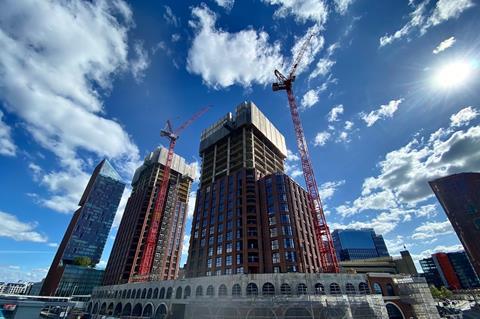Work on affected projects can’t start until regulator says they comply with new standards
Piling contractors have said more needs to be done to tackle the delays blighting high-rise work caused by safety delays, warning they were leading to lay-offs and investment decisions being deferred.
New figures obtained from the Building Safety Regulator (BSR) show more than 90 higher-risk buildings – defined as having seven storeys or being above 18m in height – are currently on hold pending design approval.
Under the Building Safety Act’s Gateway 2 checks, construction cannot start until the BSR has confirmed that the design complies with all relevant building regulations and safety standards.

A total of 92 new higher-risk buildings are on hold – 79 are under review and 13 have stalled because further information has been requested about the project.
The figures also show work on 641 existing higher-risk buildings is also on hold.
But in a statement, the Federation of Piling Specialists said the hold-ups were becoming critical. It said: “The current approval process is proving unsustainable. Many FPS members are now being forced to consider reducing staff numbers and scaling back investment.
“These delays, which extend far beyond the anticipated 12 week timeline, are placing severe strain on the geotechnical and wider construction sectors, particularly affecting high-rise, commercial and residential developments.
“Since the introduction of the new regulatory framework in April 2024, only a limited number of projects have received approval, leaving FPS members frustrated by prolonged delays in design finalisation and a lack of incoming work.”
It added: “The situation is particularly acute in London and other urban areas, where projects over seven storeys are stalled, creating a ripple effect across the geotechnical, demolition, and construction supply chains.”
FPS chair Malcolm O’Sullivan warned: “The reality is that approval times of six months or more are simply not viable. These delays are undermining investment, recruitment, and the wider stability of the sector.”
In a statement, the BSR said: “We recognise that engaging with a new system and requirements is not something which can be achieved overnight and we’re continuing to work closely with industry to identify areas where we can strengthen our advice and guidance for applicants.
“This includes weekly discussions with partners including the Construction Leadership Council, Build UK, Dept for Business and Trade and Home Builders Federation.”
Last year, industry leaders voiced concerns about competence and resourcing at the BSR.
Andy Mullins, head of quality at the Hill Group, told the Building the Future conference in London his firm was the first housebuilder to have gone through the Gateway 2 process on a new build.
But he said it took 27 weeks to be approved, while another application had been pending for 31 weeks.




























No comments yet